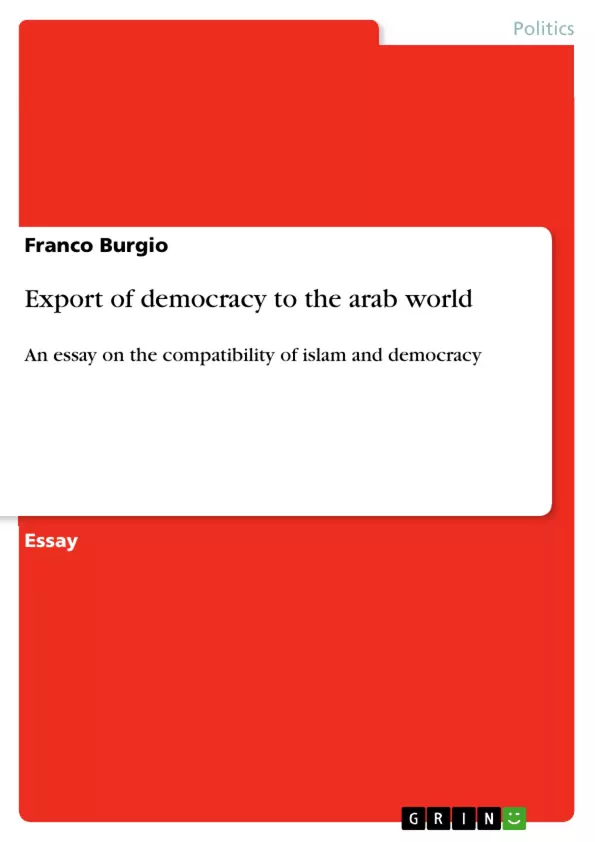Western Initiatives in the last years and especially in the aftermath of 11 September 2001
multiplied and intensified (e.g. the U.S. proposal of a Greater Middle East Initiative, Barcelona
Process by the EU) in order to bring democracy to a region which by any definition has the Arab
World at its core and which in comparison to Eastern Europe and Latin America seems reluctant
to follow the common trend of establishing representative democracies as form of government.
Besides the “exportation” efforts also internal Arab political discourse generally endows
democracies with a virtually talismanic quality capable of solving all outstanding problems, as
Al-Azmeh rightly points out.
The Arab Word is stretching from Morocco in the west to Oman in the east including a variety of
different state structures (small city states like Kuwait , large states like Libya, extremely rich
and extremely poor regions)3 and is populated by heterogeneous ethnic groups (large Berber
minorities in the Mahgreb and Kurdish, Turkic and Armenian minorities in the Mashreq).
However big the differences may be two common nominators can doubtless be identified: Islam
and a democracy deficit . The questions arising are obvious. Is the message of the prophet
responsible that no stabile democratic government is in sight in the Arab World ? Is the deficit in
democratic ruling indeed a cultural and religious problem ? Is the Koran compatible with the
concepts of democracy ?
Inhaltsverzeichnis (Table of Contents)
- A. Introduction
- B. Limits
- I. Democracy as Universal Model
- 1. Modernity
- 2. Democracy
- 3. Islam and Democracy
- 4. Perception of the Current Situation of Democracy in the Arab World
- 5. Conclusion and Prediction
- II. Democracy and the Clash of Civilizations
- 1. Modernity
- 2. Democracy
- 3. Islam and Democracy
- 4. Perception of the Current Situation of Democracy in the Arab World
- 5. Conclusion and Prediction
- III. Islamic Modernity
- 1. Modernity
- 2. Democracy
- 3. Islam and Democracy
- 4. Perception of the Current Situation of Democracy in the Arab World
- 5. Conclusion and Prediction
- IV. Conclusion
- Bibliography
Zielsetzung und Themenschwerpunkte (Objectives and Key Themes)
This paper explores the compatibility of Islam and democracy in the context of the Arab World. It aims to analyze the perspectives on democracy within the Arab region, examining different schools of thought regarding the relationship between Islam and democratic values. The main themes explored are:- The universality of democracy
- The clash of civilizations between Western and Arab societies
- The role of Islamic modernity in shaping political systems
- The impact of cultural and religious factors on democratic processes
- The compatibility of Islamic principles with democratic concepts
Zusammenfassung der Kapitel (Chapter Summaries)
The paper begins by exploring the concept of democracy as a universal model. It examines the role of modernization and its impact on cultural and political structures. The paper analyzes the perspectives of those who view democracy as a universally applicable system and those who consider it inherently incompatible with Islamic values. The second chapter delves into the "clash of civilizations" narrative, exploring the perceived conflict between Western democracy and Islamic traditions. It examines the arguments of those who view democracy as a Western invention incompatible with Arab culture. The third chapter examines the concept of Islamic modernity, analyzing the potential for a democratic system rooted in Islamic principles. The paper explores the possibility of a "sui generis" form of democracy based on a moderate and reformed interpretation of Islamic tradition.Schlüsselwörter (Keywords)
This paper focuses on the key concepts of democracy, Islam, and the Arab World. It examines the relationship between these concepts, exploring the compatibility of Islamic principles with democratic values. The paper investigates the role of modernity, cultural factors, and religious interpretations in shaping political systems in the Arab region. Important themes include the universality of democracy, the clash of civilizations, Islamic modernity, and the development of a "sui generis" form of democracy.Frequently Asked Questions
Is Islam compatible with democracy?
The paper examines this complex question, exploring whether the Koran is compatible with democratic concepts or if there is a religious "democracy deficit."
What is the "Clash of Civilizations" narrative?
It is a theory suggesting a fundamental conflict between Western democratic values and Islamic traditions, which the paper analyzes critically.
What initiatives have been launched to export democracy?
Notable examples include the U.S. Greater Middle East Initiative and the EU's Barcelona Process.
What is "Islamic Modernity"?
A concept exploring the possibility of a unique form of democracy rooted in reformed Islamic principles rather than just Western models.
Why does the Arab world seem reluctant to follow the global trend of democracy?
The research investigates whether this reluctance is due to cultural, religious, or geopolitical factors specific to the region.
- Quote paper
- Franco Burgio (Author), 2007, Export of democracy to the arab world, Munich, GRIN Verlag, https://www.grin.com/document/113628



